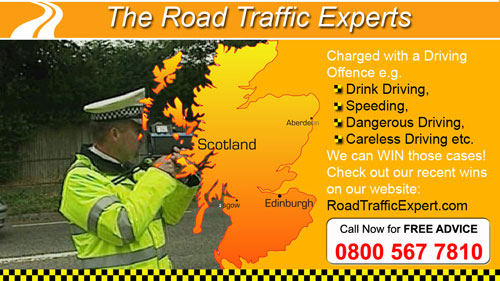Speeding Charges in Scotland
SPEEDING OFFENCES
In Scotland speeding offences are dealt with in one of two ways:
(1) By the issue of a fixed penalty entailing the imposition of three penalty points and a financial penalty of £100. Not everyone may be eligible for a fixed penalty. Before issuing a fixed penalty the police may do a PNC check on the number of points a suspect has on their licence and how long they have held a valid UK licence. If for example they discover that someone has 9 points on their licence they will not issue a Fixed Penalty because the matter will require to go to court for consideration under the totting up procedure.
(2) By a court appearance.
Speeding offences by far represent the majority of road traffic cases called in court every day. The police invest a huge proportion of their time and resources in racking up speeding statistics. It is by far the most often committed road traffic offence. The law relating to this offence is, very helpfully, extremely complex. This is very much to an accused's advantage as it allows us to take advantage of a number of self taught technicalities which we have identified and developed over the years. Time after time we have seen people pleading guilty on legal advice, even from so called road traffic specialists, to similar cases as our own, when we know that we could have secured a not guilty outcome for them. We have even appeared in court and had 3 speeding cases thrown out on the same day, all for different reasons and seen other solicitors plead their client guilty before us.
We have a number of different strategies depending on the type of case - and like a top chef we like to keep many of them secret which means sometimes waiting until the end of a court list before we appear.
We often represent clients with multiple speeding cases in situations where they think they're in an impossible situation. We are very successful at global strategies and are exceptionally effective at resolving concurrent speeding cases with a successful outcome.
We have an in-depth knowledge of all speed detection manuals, how the devices operate, their weaknesses and strengths - and therefore the best way to overcome them. For example there is all the difference between a dot and a reticule in a laser device when it comes to defending a speeding offence in certain types of cases.
If you really need the best prospects of success - don't leave it to chance - contact us now.
Where a case proceeds to court the severity of punishment for a speeding offence depends on how fast a driver is traveling in relation to the legal speed limit on a given stretch of road.
If you are caught speeding on a regular road then you will receive between three and six penalty points and get a fine of up to £1000. However, if your speed is grossly in excess of the applicable speed limit then you could find yourself subject to a discretionary ban.
If you are caught speeding on a motorway then you will receive between three and six penalty points and a fine of up to £2500. Again, if your speed is grossly in excess of the speed limit you may leave yourself open to a discretionary ban.
It is also worth bearing in mind that those caught traveling at grossly excessive speeds can even be prosecuted for dangerous driving under section 2 of the Road Traffic Act 1988 and could find themselves subject to mandatory disqualification of at least twelve months or even a sentence of imprisonment.
Like many other offences referred to under the road traffic legislation speeding is a "strict liability" offence which means that unless you can establish that the evidence against you is defective then you will automatically be found guilty.
Nevertheless the law in relation to speeding offences in Scotland is highly technical and subject to many potential pitfalls for the ill-prepared prosecutor or police officer. It is therefore fundamentally important that any person facing prosecution for an offence of this nature seeks expert legal advice at an early stage.
Notice of Intended Prosecution:
For example, you may not know that before the prosecution can seek a conviction for speeding it must, subject to very limited exceptions, provide a driver with a Notice of Intended Prosecution, either verbally through the police officer who stopped you or via post. One such exception to this rule is where the driving in question has resulted in an "accident" (a concept which is very broadly defined under the road traffic legislation and can include simply causing another driver to take evasive action to avoid a collision)
Also, the Crown require to prove that the equipment used to detect speed was working accurately at the time of the offence and, in the event that the equipment in question was being operated by a police officer, that the officer was operating the equipment properly.
The prosecution often seeks to obviate the need to lead evidence to the effect that a given device was working accurately and had been fully tested before and after its use by serving a certificate upon an accused person confirming that such testing had taking place. If such a certificate goes unchallenged by an accused person then its contents are deemed to have been established and the accuracy of the device cannot be challenged later.
Speed camera types in Scotland
Prosecutions can be based upon a variety of methods. "Remote" detections such as GATSO, SVDD, SPECS, Laser with camera attached and sensor operated devices such as Truevelo, as well as detections by devices operated by police officers such as VASCAR, PILOT and hand held laser devices.
GATSO cameras (the raised boxes stationed at the side of the road) are perhaps the most commonly encountered type of speed camera encountered by road users and account for a considerable numbers of speeding offences prosecuted in Scottish Courts.
As with any other speeding offence prosecuted in Scottish Courts a prerequisite for prosecution is the service of a notice of intended prosecution. Generally speaking if you do not receive such a written notice within fourteen days of the suspected offence then it is unlikely that any prosecution will succeed against you.
A popular fallacy is that GATSO cameras can ensnare drivers driving both towards and away from them. This is not so. Such devices can only work where a driver is driving away from the camera. Because Gatso cameras capture the rear of a motor vehicle the registered keeper of the motor vehicle should thereafter receive a Notice of Intended Prosecution under section 172 of the Road Traffic Act 1988 requesting that they name the person driving their vehicle at the time of the offence. Failure to provide driver details is an offence in its own right (see separate subject heading).
As with any other speed detection camera the prosecution require to lead evidence that a Gatso camera was properly calibrated at the time of the offence.
Because the legal rules and provisions applicable to the correct operation of speed detection devices are so technically complex Richard Freeman Road Traffic Lawyers frequently enlist the assistance of independent experts to scrutinise the methods adopted by police officers in utilising such devices. Such experts are usually retired road traffic police officers whose considerable experience can, more often than not, be put to immense use on behalf of individuals charged with speeding offences.
Speeding offences can very easily cost a driver their license and in, many cases, their livelihood. It is therefore vitally important that those facing prosecution for such offences seek expert legal advice at an early stage. If you have received a speeding citation or Notice of Intended Prosecution then contact Richard Freeman Road Traffic Lawyers immediately for sound advice. Remember, we could save your license.
We are given regular referrals from other solicitors who know of our exceptional results and our unique approach to speeding cases.
We are the official legal advisors on road traffic law to FACT magazine which is a UK wide trucking and commercial fleet magazine

We Cover All of Scotland

All of Scotland Covered:
Including: Glasgow Edinburgh Aberdeen Dundee Paisley Renfrewshire East Kilbride Perth Livingston Cumbernauld Hamilton Kirkcaldy Dunfermline Ayr Kinross Kilmarnock Inverness Greenock Inverclyde Port Glasgow Coatbridge North Lanarkshire Glenrothes Fife Airdrie Falkirk Stirling Rutherglen Dumfries Galloway Motherwell Wishaw Clydebank West Dunbartonshire Bearsden East Dunbartonshire Cambuslang Newton Mearns East Renfrewshire Bishopbriggs Musselburgh East Lothian Arbroath Angus Polmont Elgin Renfrew Renfrewshire Alloa Bellshill Clackmannanshire Blantyre Dumbarton West Dunbartonshire Kirkintilloch Clarkston
East Renfrewshire Bathgate West Lothian Stenhousemuir Falkirk Peterhead Aberdeenshire Barrhead
Grangemouth Falkirk St Andrews Kilwinning Ayrshire Viewpark Buckhaven Penicuik Midlothian Stranraer Johnstone Erskine Larkhall Moray


